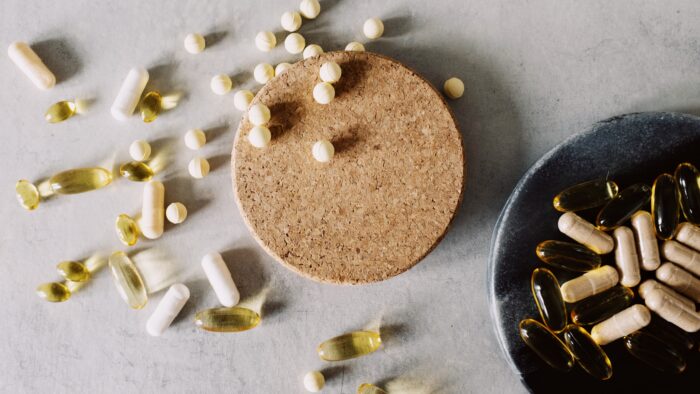Dr. Vyshna Ravindran and Dr. Bhaswati Bhattacharya look into the increasing trend of consuming dietary supplements, the continued tension between health and medicine, and the laws and regulations formulated to work around this tension
 Around the world, the burgeoning industry of dietary supplements has required laws that protect it from pharmaceutical regulations for chemical compounds and allow patients the freedom to use products such as vitamins, probiotics, extracts, herbs, protein powders, and minerals as well as trace elements without fear of domination over their personal health choices. This tension is best seen when food is considered medicine.
Around the world, the burgeoning industry of dietary supplements has required laws that protect it from pharmaceutical regulations for chemical compounds and allow patients the freedom to use products such as vitamins, probiotics, extracts, herbs, protein powders, and minerals as well as trace elements without fear of domination over their personal health choices. This tension is best seen when food is considered medicine.
Terms around the world vary from dietary supplement, food supplement, phytopharmaceutical, health supplement, vitamins and minerals, health product, and food product.
In the United States, the tension between health and medicine has created laws that regulate these chemical substances more like food products and not as drugs, because they were taken out of foods during the food processes that emerged in the past century. Called "dietary supplements" in the USA, the government regulation of DSHEA in 1994 allows them to be marketed and sold without the required preclinical trials that drugs require1.
As long as supplement makers make no curative or medical claims -- skirting the fine line between health and medicine -- their claims must not be substantiated by any clinical evidence; else they will be forced to file a New Drug Application. Any claims of benefit against disease stand the risk of prosecution by drug regulatory authorities, because any ingestible item - food, dietary supplement, or new drug -- that shows medical benefits must undergo the testing required for drugs to be safe for the American public; this burden of proof is both time-consuming and expensive.
Of course, around the world where supplements are regulated differently and where these products are legally regarded as effective medicines, there are excellent studies of proof of efficacy. However, it is legally unwise and a necessary strategy to distance any dietary supplements from any claims made by their maker. At best, this confuses the consumer. But consumers, who are dedicated to taking certain compounds have always found ways and means for securing the supplement they wish to intake, in the name of personal freedom.
Dietary supplements have also become popular due to experts who create alarming connections between the chronic depletion of the soil due to profit-based farming and lack of proper bioavailable nutrient content in our food, rather than emphasizing the deleting techniques of food processing. Many rip away minerals, then reconstitute them artificially from non-native sources. Others add nickel and other metals as well as bleach to purify the smell and colors of natural products so they are more palatable. Still, other processes add fillers, preservatives, binders, colouring agents, flavour agents, and coating agents in the name of usual standards.
No regulation requires the labeling of non-nutrient in detail, such as the concerning percentages of these non-beneficial elements in each pill. These form the massive bulk of most dietary supplement pills. Capsules have non-nutrient compositions, either of the animal intestine, gelatin usually made from animal collagen taken from unidentified parts of the body, or plant cellulose. The burden that this unnecessary bulk puts on the body's detoxifying mechanisms is also significant and may correlate with the overwhelming reports of dietary supplement-induced liver injury (DSILI), which is on the rise2. Documented case reports of herbs and dietary supplements have identified the spectrum of DSILI: “elevated liver enzymes, hepatitis, steatosis, cholestasis, hepatic necrosis, hepatic fibrosis, hepatic cirrhosis, veno-occlusive disease, acute liver failure requiring a liver transplant, and death.” 3
Through marketing, dietary supplement makers have convinced consumers that supplements are superior to a wholesome meal and essential for compensating perceived insufficiencies of conventional store-bought food. In a time-conscious society, it is also easier to pop a pill on the way to school or work than to source then prepare organic and healthy food, especially in places where there are shortages of unpackaged food. People living in housing without kitchens, and people who travel frequently readily accept the convincing arguments for making dietary supplements part of their rationalized lifestyle.
These issues have never been addressed by large-scale evidence-based dietary intervention studies. Protecting the public from blind unrestricted intake of supplements seems less important than protecting them against medical claims of benefit. In ancient times, medicines were defined as those interventions that did no harm.
Any evidence that emerges that dietary supplements do indeed provide some benefit is countered by the legal consequences of providing adequate evidence for efficacy, as then the items are pulled off the market and forced to undergo paths for medical claims. In such biased states of evidence-making, studies that would point towards long-term side effects are also suppressed. Interestingly, vitamin toxic levels due to excess consumption have been selectively reported, fueled by the quack busters, who prefer profit and control of the pharma industry.
Observant health-seekers, who were encouraged by the freedom to access supplements have been following the trends and fall into two categories: those who seek more technological advances to help them regulate their intake of protein powders, vitamins, and high-dose biomarkers associated with health, often bio-hacking their way through the system; and those who have returned to hunting for nutriments that connect them to ancient successful and delicious ways of eating. Heritage foods and ancient grains have come alive again.
References
- Questions and Answers on Dietary Supplements [Internet]. U.S. Food and Drug Administration. 2022 [cited 1 February 2022]. Available from: https://www.fda.gov/food/information-consumers-using-dietary-supplements/questions-and-answers-dietary-supplements
- García-Cortés M, Robles-Díaz M, Ortega-Alonso A, Medina-Caliz I, Andrade RJ. Hepatotoxicity by Dietary Supplements: A Tabular Listing and Clinical Characteristics. Int J Mol Sci. 2016;17(4):537. Published 2016 Apr 9. doi:10.3390/ijms17040537
- Brown AC. Liver toxicity related to herbs and dietary supplements: Online table of case reports. Part 2 of 5 series. Food Chem Toxicol. 2017;107(Pt A):472-501. doi:10.1016/j.fct.2016.07.001





